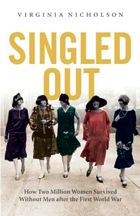Review: Singled Out
A generation of women was forced to choose a path other than marriage following the First World War. Hugh Massingberd celebrates those indomitable ladies


Singled Out: How Two Million Women Survived Without Men After the First World War
Virginia Nicholson (Viking, £20)
Much as I identify with Bertie Wooster, I cannot condone his campaign for the suppression of aunts ('Sooner or later, out pops the cloven hoof'). I admired my aunts, especially those of the maiden variety, who had the misfortune to find themselves among the insensitively labelled 'Surplus Women' after the slaughter of the First World War. My beloved nanny, who lost her boyfriend in the trenches, was another of that bereaved gene-ration, born between the end of the 19th century and the beginning of the 20th.
In this wonderful and wide-ranging book, Virginia Nicholson sets out 'to hear and understand what happened to a generation of young women who were forced, by a tragedy of historic proportions, to stop depending on men for their income, identity and their future happiness'. She succeeds triumphantly in paying a long-overdue tribute to these indomitable ladies.
The author makes the important point often missed in such dramas as Oh! What a Lovely War that 'the chances of dying were higher if you were an officer than if you were a private'. In 1917, the senior mistress of Bournemouth High School for Girls spelt it out for her pupils: 'Nearly all the men who might have married you have been killed. You will have to make your way in the world as best you can? You will have to struggle.'
With extraordinary empathy and much good humour, Mrs Nicholson, a great-niece of Virginia Woolf, concentrates upon individual stories rather than dreary demographics in illustrating how the 'inter-war decades saw the single woman's emergence from the twilight zone of maiden aunthood into an altogether sunnier realm'. She has done an impressive amount of research into unpublished autobiographies and garnered invaluable material from interviews. Although some of the heroines featured are well known such as the novelists Winifred Holtby (one of whose characters observes: 'I was born a spinster, and by God, I'm going to spin') and Richmal Crompton (who described herself as 'the last surviving example of the Victorian pro-fessional aunt') most belong to the illustrious obscure.
And what a splendid set of dedicated, brave, cheerful, inspiring, selfless pioneers they were: teachers and academics, nurses and doctors, lawyers and 'business girls', archaeologists and explorers, scientists and engineers. My special pin-ups included Gertie Maclean, founder of that excellent organisation Universal Aunts; Dame Caroline Haslett, champion of electricity as a liberating force for women; and Amy Langley, a dressmaker, who, at 82, found romance in her retirement home exemplifying Sandy Wilson's song It's Never Too Late To Fall In Love.
Sign up for the Country Life Newsletter
Exquisite houses, the beauty of Nature, and how to get the most from your life, straight to your inbox.
There are many marvellous quotes ('Once you get over the disgrace, it's the best life!') and memorable anecdotes. The author has made good use of 'agony aunt' correspondence, which yields plenty of pathos, as well as the odd joke. One naïve girl couldn't under-stand why her mother found her greatest friend, Doris, 'undesirable'. 'Doris can't stand men and is never in the least interested in them.' In the Second World War, Mary Milne, the revered matron of St Mary's Hospital, Paddington, whose fiancé had been killed in the First World War, encountered some male medical students in the nurses' home during the Blitz. Her only comment was: 'I suppose you're all busy firewatching, gentlemen.'
Country Life is unlike any other magazine: the only glossy weekly on the newsstand and the only magazine that has been guest-edited by HRH The King not once, but twice. It is a celebration of modern rural life and all its diverse joys and pleasures — that was first published in Queen Victoria's Diamond Jubilee year. Our eclectic mixture of witty and informative content — from the most up-to-date property news and commentary and a coveted glimpse inside some of the UK's best houses and gardens, to gardening, the arts and interior design, written by experts in their field — still cannot be found in print or online, anywhere else.
-
 A well-connected rural playground with 23 acres on the edge of the South Downs National Park
A well-connected rural playground with 23 acres on the edge of the South Downs National ParkOld House Farm is an impressive family home with a wealth of amenities that would inspire any rural passion.
By Arabella Youens Published
-
 The UK gets its first ‘European stork village’ — and it's in West Sussex
The UK gets its first ‘European stork village’ — and it's in West SussexAlthough the mortality rate among white storks can be up to 90%, the future looks rosy for breeding pairs in southern England.
By Rosie Paterson Published
